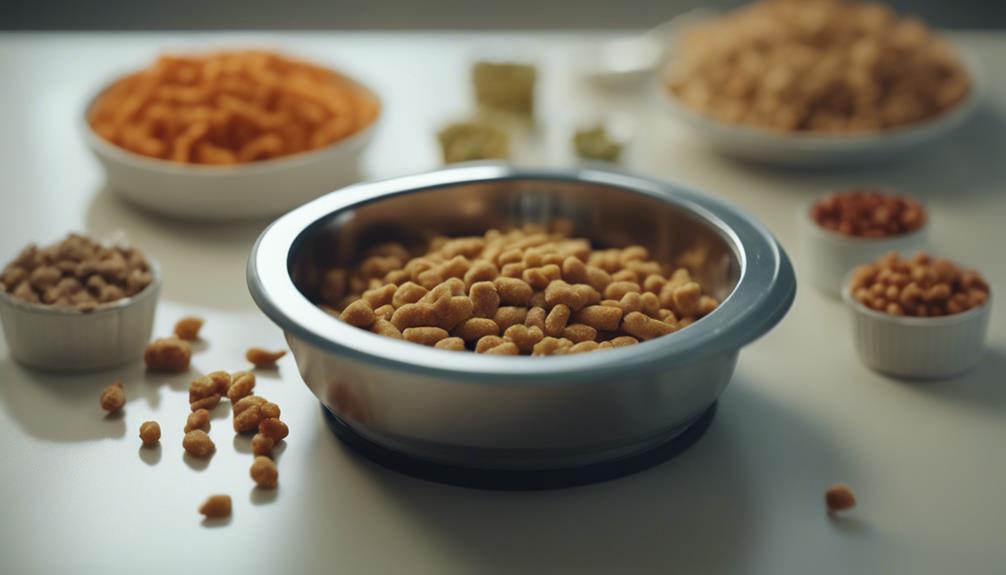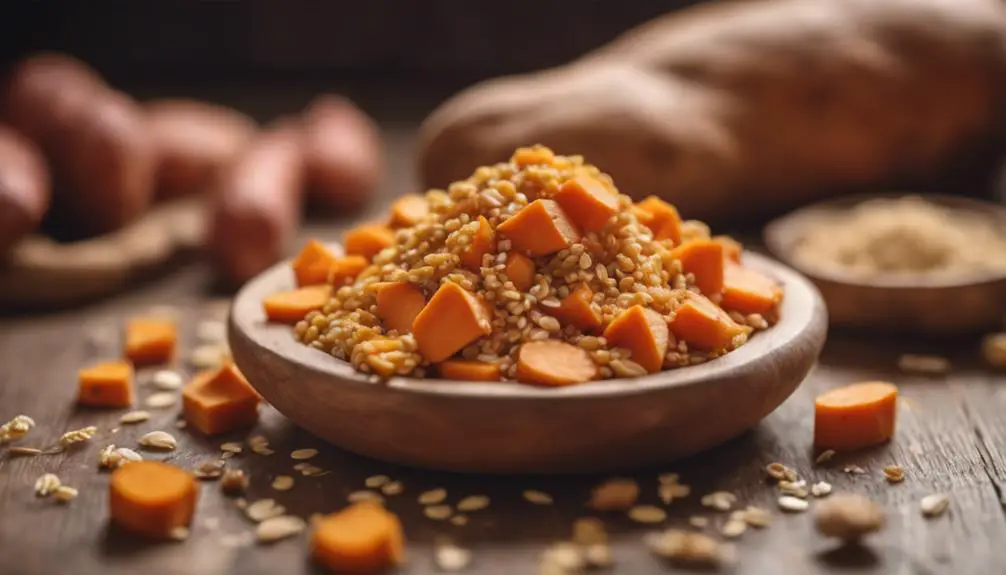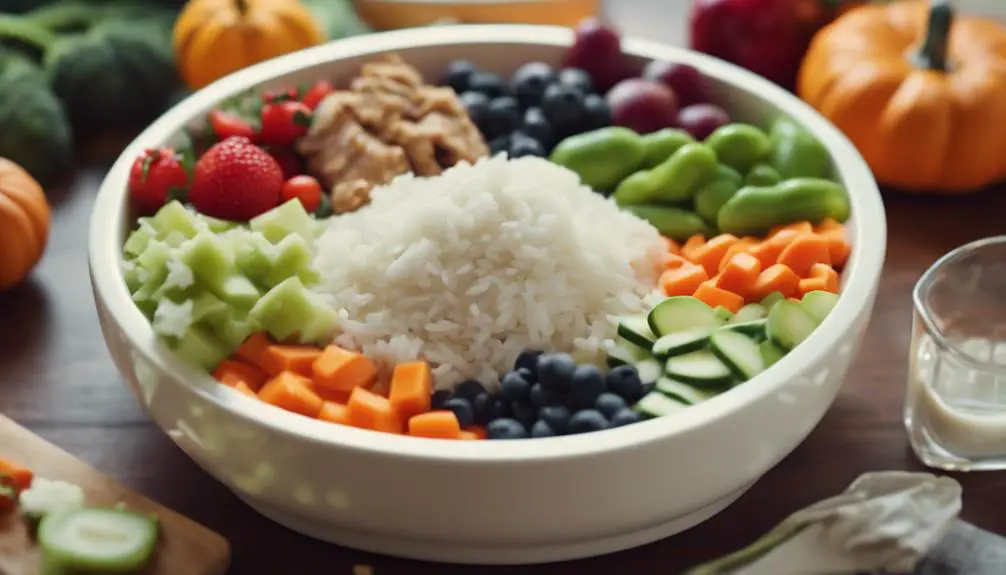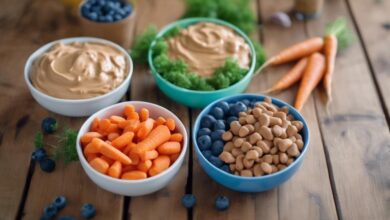What Can Dogs Eat With Pancratitis
I stick to lean meats like chicken or turkey, fish rich in omega-3s, and eggs. Sweet potatoes and brown rice are great carbs. Opt for low-fat dairy like plain yogurt. Omega-3 fats in coconut oil help me. I focus on vitamins B and E, zinc, and essential fatty acids. The key is small, frequent meals with lean proteins and complex carbs. Avoid high-fat foods. If you want to know more about managing pancreatitis effectively, find out the full details.
Key Takeaways
- Lean meats like chicken and turkey are suitable protein sources.
- Opt for easily digestible carbohydrates such as sweet potatoes.
- Include healthy fats like omega-3s and coconut oil for anti-inflammatory benefits.
- Ensure meals are low in fat to reduce strain on the pancreas.
- Feed small, frequent meals to support digestion and prevent overloading.
The Importance of a Proper Diet

Maintaining a suitable diet plays a vital role in managing pancreatitis in dogs. When a dog is diagnosed with pancreatitis, it's essential to provide a diet that's easily digestible and gentle on the inflamed pancreas. This means avoiding high-fat foods that can trigger flare-ups and opting for low-fat options instead.
Feeding small, frequent meals throughout the day can help prevent overloading the digestive system, giving the pancreas a chance to recover. Additionally, ensuring adequate hydration is essential for overall health and aiding in digestion.
Consulting with a veterinarian or a canine nutritionist to create a balanced diet plan tailored to your dog's specific needs is highly recommended. Remember, a well-managed diet is key to supporting your furry friend's health during pancreatitis treatment.
Recommended Protein Sources
When managing pancreatitis in dogs, a focus on appropriate protein sources becomes pivotal in supporting their digestive health. Here are some recommended protein sources worth considering:
- Lean Meats: Opt for lean cuts of poultry such as skinless chicken or turkey to reduce fat intake.
- Fish: Incorporate fish like salmon or whitefish, which are rich in omega-3 fatty acids known for their anti-inflammatory properties.
- Eggs: Eggs provide a high-quality protein source that's easily digestible for dogs.
- Low-Fat Dairy: Choose low-fat options like plain yogurt or cottage cheese to add variety to your dog's protein intake.
Beneficial Carbohydrates for Dogs

To support a dog's digestive health during pancreatitis, incorporating beneficial carbohydrates into their diet can provide essential nutrients and energy. Opt for easily digestible options like sweet potatoes, oats, and brown rice. These carbohydrates can help maintain stable blood sugar levels and provide a good source of fiber, promoting digestive regularity.
Including carbohydrates in moderate amounts can also prevent spikes in blood glucose levels, which is vital for dogs with pancreatitis. Be cautious with high-fat carbohydrates such as pastries or fried foods, as they can exacerbate the condition. Instead, focus on whole grains and complex carbs that offer lasting energy without straining the pancreas.
Healthy Fats for Pancreatitis Management
I love incorporating healthy fats into my dog's diet to help manage pancreatitis. Omega-3 fatty acids provide anti-inflammatory benefits, while coconut oil is a great option for adding healthy fats.
However, I always make sure to moderate avocado intake due to its high fat content.
Omega-3 Benefits
Omega-3 fatty acids play an important role in managing pancreatitis by providing essential healthy fats that support overall pancreatic health. These healthy fats can help reduce inflammation and promote healing in the pancreas.
Here are four key benefits of incorporating omega-3 fatty acids into a dog's diet:
- Anti-Inflammatory Properties: Omega-3s help decrease inflammation in the pancreas, which is essential for managing pancreatitis.
- Improved Digestive Function: These healthy fats support digestive health, aiding in better nutrient absorption and overall gastrointestinal function.
- Enhanced Immune System: Omega-3s can boost the immune system, helping the body fight off infections and recover more effectively.
- Heart Health: They promote cardiovascular well-being, which is important for overall health maintenance in dogs.
Coconut Oil Option
Incorporating coconut oil into a dog's diet can be a beneficial option for managing pancreatitis due to its healthy fats content. Coconut oil contains medium-chain triglycerides (MCTs), which are easily digestible and can provide a quick source of energy for dogs with pancreatitis. The lauric acid in coconut oil also possesses antimicrobial properties, which can support digestive health. When introducing coconut oil to a dog's diet, it is essential to start with small amounts and monitor for any adverse reactions. Below is a table highlighting the key benefits of coconut oil for dogs with pancreatitis:
| Benefits of Coconut Oil for Dogs with Pancreatitis |
|---|
| Easily digestible MCTs for quick energy |
| Lauric acid with antimicrobial properties |
| Supports digestive health |
Avocado Moderation
Moderating avocado intake is essential for managing pancreatitis as it provides healthy fats essential for a dog's diet. Avocados are nutritious but should be given in moderation to prevent any adverse effects on a pancreatitis condition. Here's why avocado moderation is vital:
- Healthy Fats: Avocados contain monounsaturated fats that are beneficial for overall health.
- Nutrient Density: They're rich in vitamins E, K, C, and B-complex vitamins.
- Fiber Content: Avocados provide dietary fiber, aiding in digestion and nutrient absorption.
- Caloric Intake: Due to their high-calorie content, feeding avocados in moderation helps manage weight and prevent obesity-related issues.
Essential Vitamins and Minerals
I'll start by underscoring the importance of a nutrient-rich diet for dogs with pancreatitis, emphasizing the need for essential vitamins and minerals.
Supplements can also play a vital role in supporting overall health and well-being.
When planning meals, it's crucial to focus on a balanced approach to make sure your dog gets all the necessary nutrients.
Nutrient-Rich Diet Options
Ensuring your dog receives essential vitamins and minerals through a nutrient-rich diet is crucial for managing pancreatitis effectively. To achieve this, consider the following key nutrients:
- Vitamin B: Essential for metabolism and energy production.
- Vitamin E: Acts as an antioxidant, reducing inflammation.
- Omega-3 Fatty Acids: Help support overall health and reduce inflammation.
- Zinc: Important for immune function and skin health.
Supplements for Health
For maintaining good health and well-being, incorporating essential vitamins and minerals through supplements is vital for managing pancreatitis in dogs.
Vitamin E, an antioxidant, can help reduce inflammation and support the immune system.
Omega-3 fatty acids are beneficial for their anti-inflammatory properties, promoting heart health and easing digestive issues.
Minerals like zinc aid in immune function and skin health.
Probiotics can assist in maintaining a healthy gut flora balance, important for digestion.
When choosing supplements, make sure they're specifically formulated for dogs, as some human supplements can be harmful to them.
Consulting with a veterinarian is recommended to determine the right supplements and dosages tailored to your dog's individual needs and condition.
Balanced Meal Planning
Planning balanced meals for dogs with pancreatitis involves ensuring they receive essential vitamins and minerals in their diet. As a responsible pet owner, I prioritize meeting my dog's nutritional needs to support their health.
Here are four key essential vitamins and minerals to take into account when planning meals for a dog with pancreatitis:
- Vitamin B: Supports energy metabolism and overall well-being.
- Vitamin E: Acts as an antioxidant, protecting cells from damage.
- Zinc: Essential for immune function and skin health.
- Omega-3 Fatty Acids: Help reduce inflammation and support heart health.
Top Foods to Avoid
Avoiding high-fat treats is vital when managing pancreatitis in dogs. Foods to avoid include fatty meats like bacon, sausage, and hot dogs, which can trigger pancreatitis flare-ups. Greasy foods like french fries, fried chicken, and hamburgers should also be off-limits. Dairy products with high-fat content such as cheese and ice cream can exacerbate symptoms and should be avoided.
It's essential to steer clear of rich gravies, buttery sauces, and fatty snacks like potato chips. Additionally, foods high in sugar like candy and sugary desserts can be harmful to dogs with pancreatitis. By eliminating these foods from your dog's diet, you can help prevent further complications and support their overall health.
Feeding Guidelines for Dogs

To establish proper nutrition for dogs with pancreatitis, it's essential to create a balanced diet that's low in fat and easy to digest. When feeding a dog with pancreatitis, consider the following guidelines:
- Low-Fat Foods: Opt for foods with a low-fat content to reduce the strain on the pancreas.
- High-Quality Protein: Choose high-quality protein sources like lean meats to support muscle health.
- Complex Carbohydrates: Incorporate complex carbohydrates such as sweet potatoes or brown rice for sustained energy.
- Small, Frequent Meals: Feed smaller, more frequent meals to prevent overloading the digestive system.
Meal Ideas for Dogs With Pancreatitis
When preparing meals for dogs with pancreatitis, focus on incorporating easily digestible proteins like boiled chicken. I suggest combining the chicken with well-cooked white rice or sweet potatoes for a balanced meal that is gentle on the pancreas. Here is a simple meal idea that you can try:
| Protein | Carbohydrate |
|---|---|
| Boiled chicken | White rice |
| Turkey | Sweet potatoes |
| Fish | Pumpkin |
| Cottage cheese | Oatmeal |
| Eggs | Quinoa |
Conclusion
Overall, it's important to remember that dogs with pancreatitis require a carefully planned diet to manage their condition. By incorporating recommended protein sources, beneficial carbohydrates, healthy fats, and essential vitamins and minerals, you can help support your dog's health and well-being.
Remember to avoid certain foods and follow feeding guidelines to guarantee your furry friend stays happy and healthy. With the right diet and care, your dog can thrive despite their pancreatitis diagnosis.

If Richie Bedard is a dog food expert, author, or any other figure in the field of dog nutrition that emerged after September 2021,






